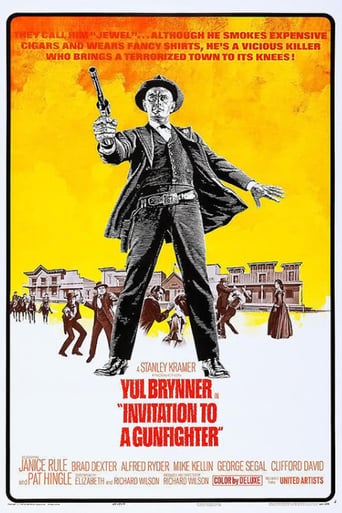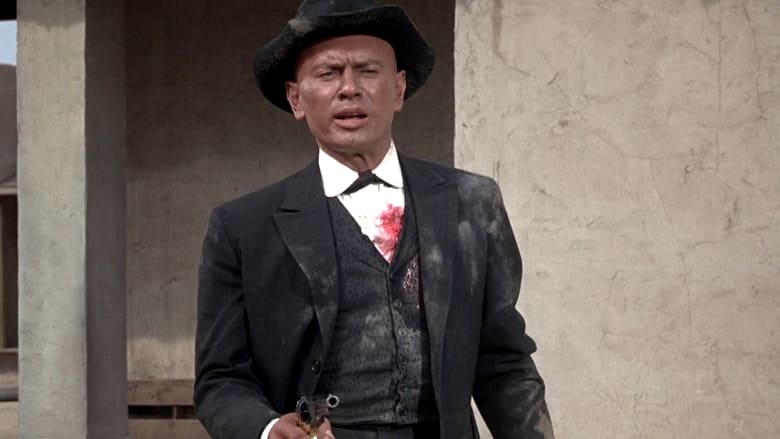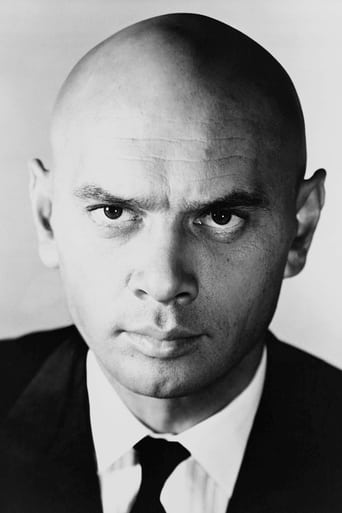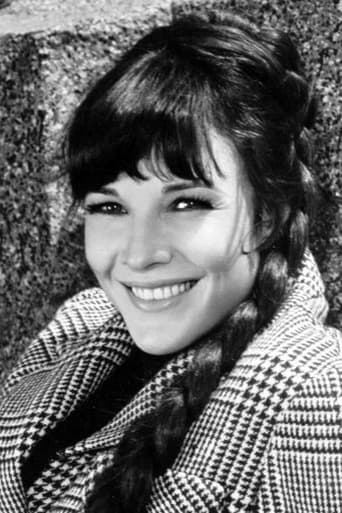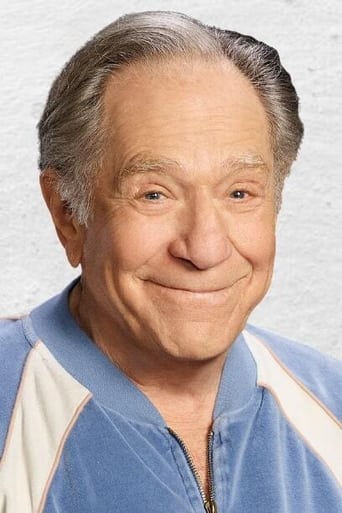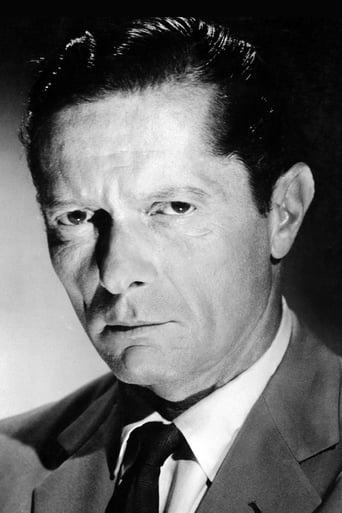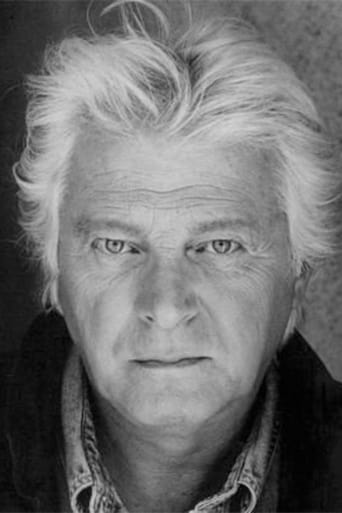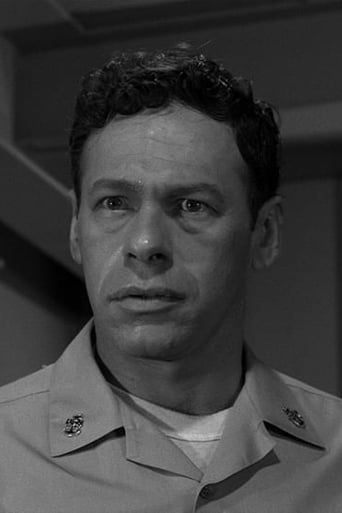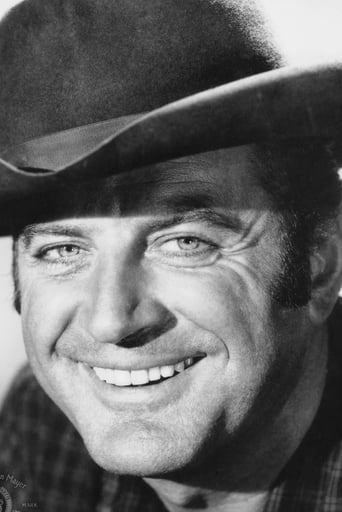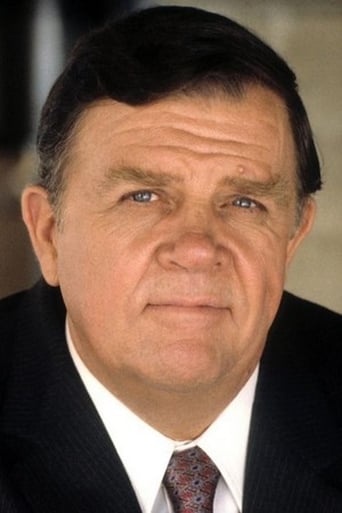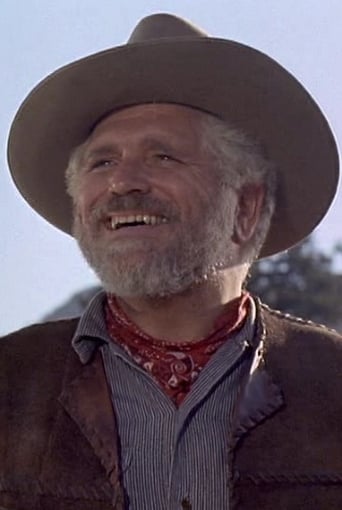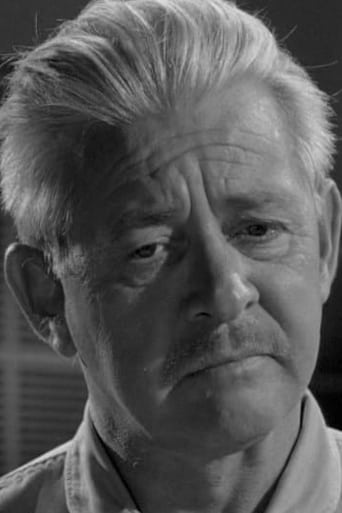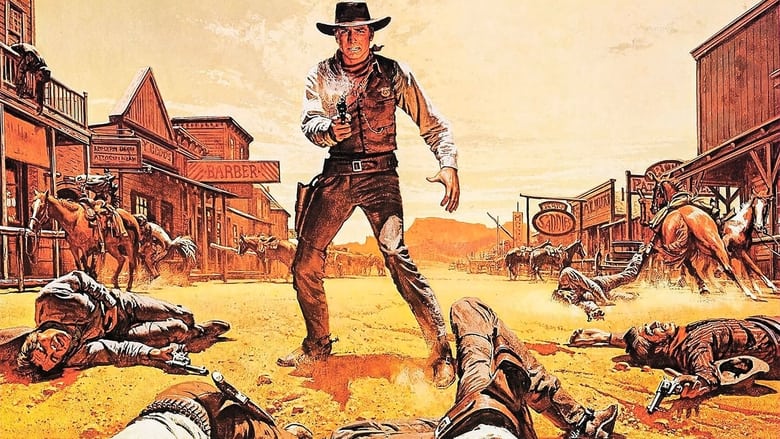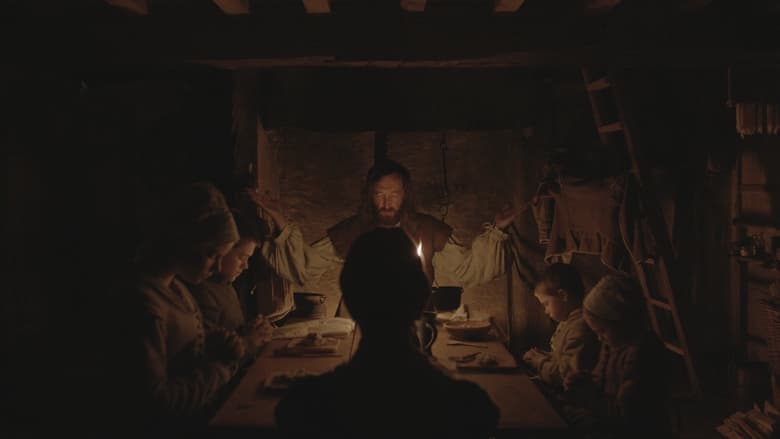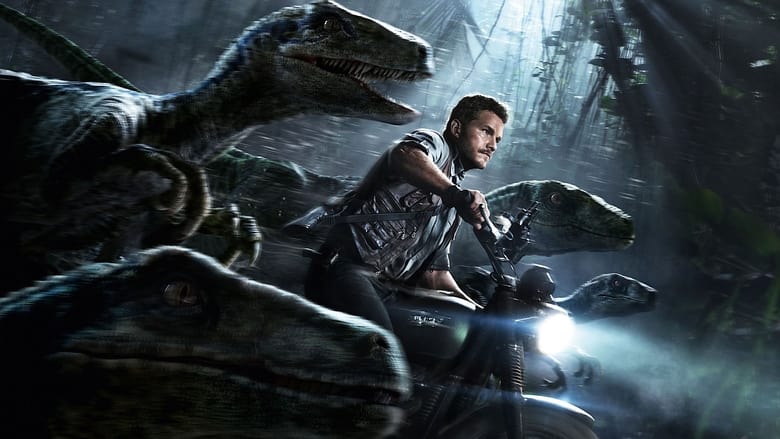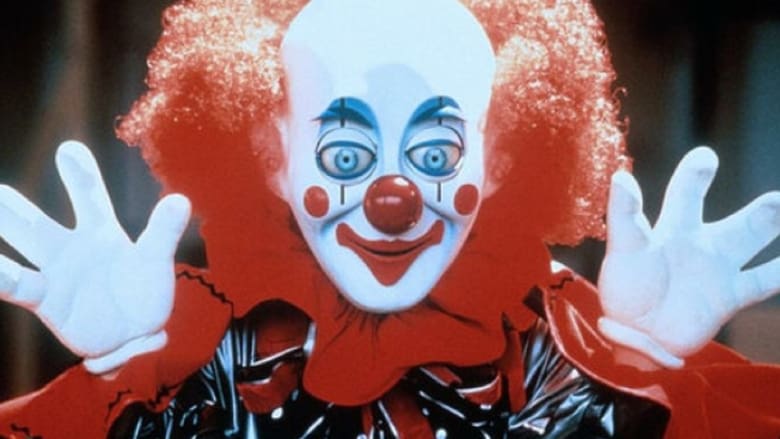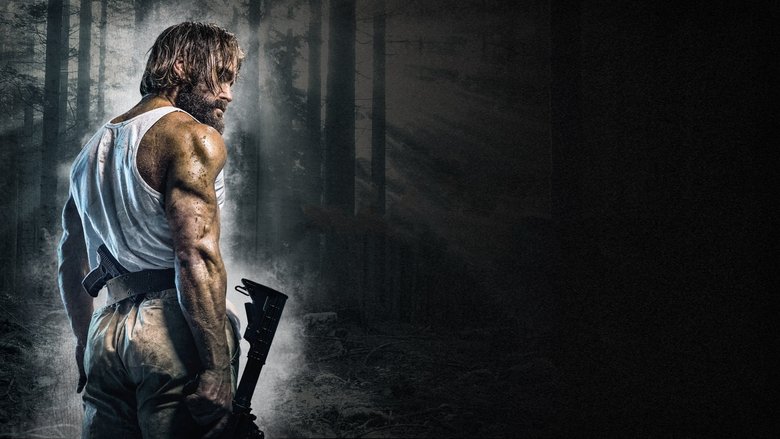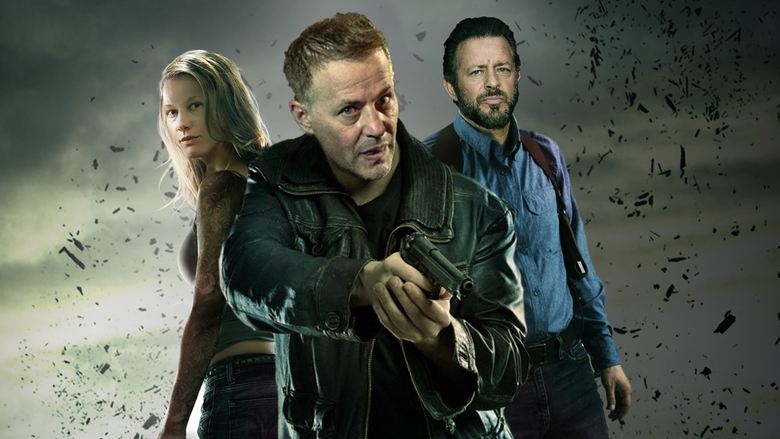In New Mexico, a Confederate veteran returns home to find his fiancée married to a Union soldier, his Yankee neighbors rallied against him and his property sold by the local banker who then hires a gunman to kill him.


Similar titles
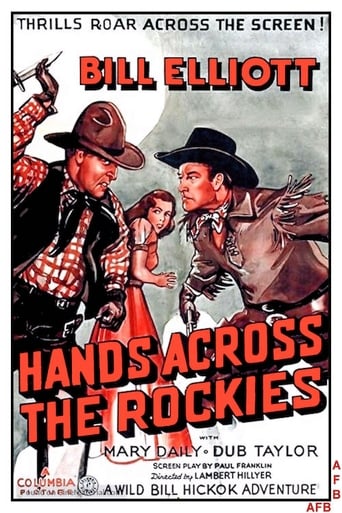
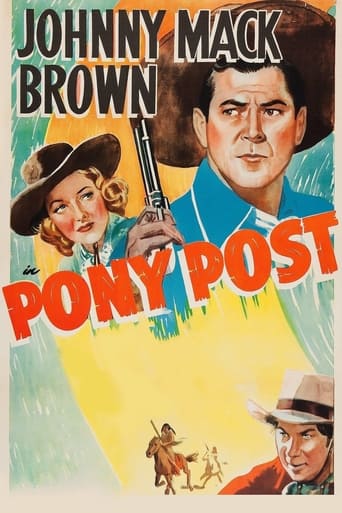
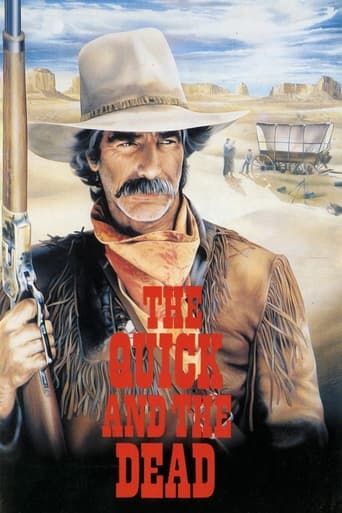
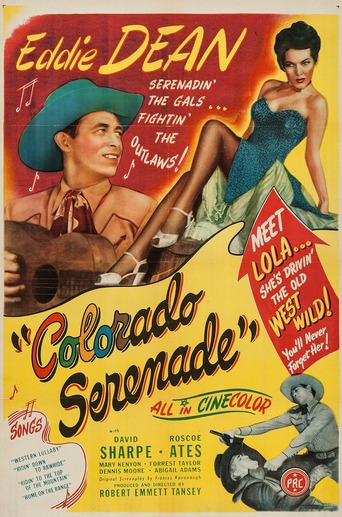
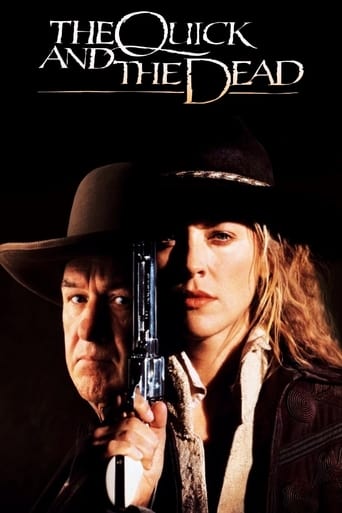
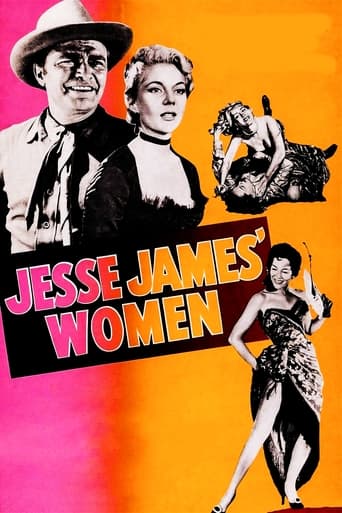
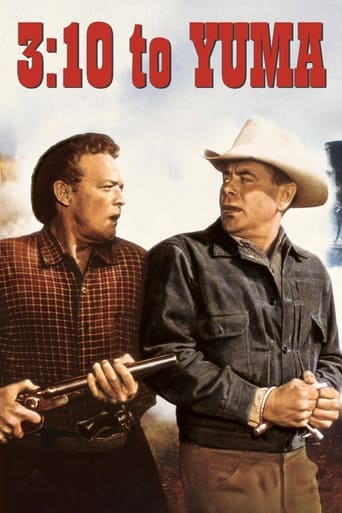
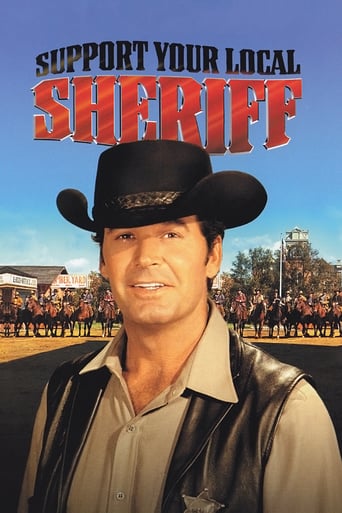
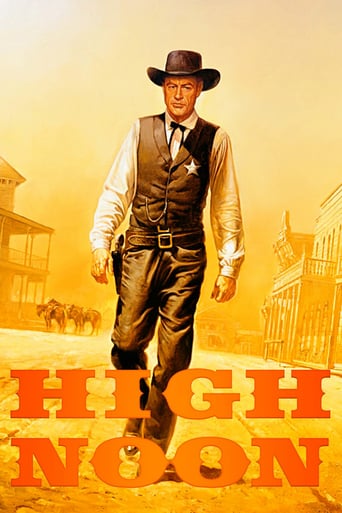
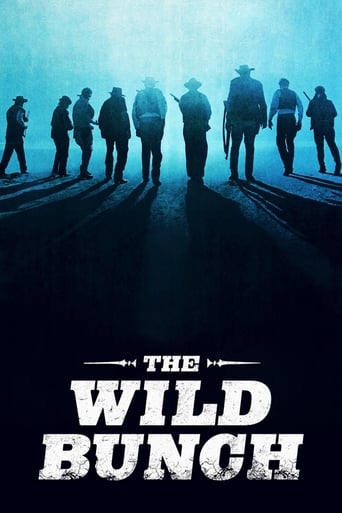
Reviews
RELEASED IN 1964 and directed by Richard Wilson, "Invitation to a Gunfighter" details events in a New Mexican town in Summer, 1965, when a Rebel Vet (George Segal) comes home to discover his small ranch sold by the local banker (Pat Hingle) and his fiancée (Janice Rule) married to a one-armed Union Vet (Clifford David). After a dubious killing, the town leaders employ a gunman to kill the former Confederate, a mysterious man-in-black from Louisiana (Yul Brynner).This is such an offbeat Western it took me a while to catch a grip. Except for the scenic opening, the locations are confined to the town with lots of scenes taking place indoors. This and the fact that it's dialogue-driven rather than action-oriented give it a TV-Western vibe (the action mainly takes place at the close). You have to listen closely to catch all the verbiage. Despite these arguable drawbacks, there are several things to appreciate, particularly Brynner's charisma as the mysterious gunfighter (he made baldness cool). There's a revelation about him in the last act that I didn't see coming. Rule plays a quality character and is easy on the eyes; plus it's interesting seeing Segal when he was so young. The tone's mostly serious with a couple worthy insights, but there are also some amusing moments, like when Jules Gaspard d'Estaing (Yul) gives instructions on the proper pronunciation of his name. THE MOVIE RUNS 92 minutes and was shot in Arizona and Universal Studios, CA. WRITERS: Incredibly, there are five writers listed in the credits. GRADE: B-/C+
"Invitation to a Gunfighter" doesn't qualify as your typical horse opera. This loquacious, pretentious, and ultimately sluggish sagebrusher about racism and civil rights—a little ahead of its time—foreshadowed Clint Eastwood's "High Plains Drifter" about a gunfighter hired by a town to protect it from a trigger-happy former Confederate soldier. Clearly, producer & director Richard Wilson and wife Elizabeth had other ideas in mind when they contrived their offbeat screenplay from veteran television writer Alvin Sapinsley's adaptation of a story by "Johnny Carson's Tonight Show" monologue writers Hal Goodman and Larry Klein. "Invitation to a Gunfighter" bears the burden of social consciousness. Can you imagine its executive producer Stanley Kramer of "The Defiant Ones," "Guess Who's Coming to Dinner," "The Juggler," and "RPM" doing a picture that shunned racism and civil rights? Mind you, Kramer also produced the classic Gary Cooper oater "High Noon" and there is a touch of "High Noon" in "Invitation to a Gunfighter." Although Yul Brynner graces this frontier yarn with its striking presence and modulated performance, "Invitation to a Gunfighter" just isn't very memorable. For example, our anti-heroic gunman doesn't demonstrate his marksmanship until 43 minutes into the story and he provides only an exhibition of his shooting skills without actually either wounding or killing anybody.Ostensibly, the story takes place in the New Mexico Territory in 1865 after the conclusion of the American Civil War. A lone Confederate soldier, Matt Weaver (George Segal of "The Owl and the Pussycat"), who has spent five weeks walking home, returns to find his farm, where he had buried his mother, in the hands of a former Union soldier, John Medford (Russel Johnson of TV's "Gilligan's Island"), mustered out of General Grant's army. Naturally, Weaver is shocked by this revelation and rampages into Pecos to confront Brewster about the sale of his property. In the process, Weaver's arrival awakens several townspeople, chiefly, a one-armed former Union soldier Crane Adams (Clifford David of "Fort Apache the Bronx"), and Adams pursues Weaver into Brewster's house where he wounds him in the arm. The sheriff (veteran character actor Bert Freed) hauls Weaver off to jail where Doc Barker (Alfred Ryder) urges Weaver to hightail it out of town for good. They explain that his father's farm went on the auction block; Brewster bought it and sold it to Medford. Eventually Weaver kills Medford and occupies the property. The Civil War claimed its share of sons and husbands from the town of Pecos and has a dire shortage of young, fit, headstrong men prepared to confront the single Confederate. The town boss, Brewster (Pat Hingle of "Hang'em High") has dispatched Crane to Santa Fe to hire a gunslinger. When Crane shows up with a two-gun kid, Dancer (Dal Jenkins of "Will Penny"), who he has promised $300, Jules runs him out of town with the merest flick of his hand. Indeed, Jules stands in the shadows of a veranda and his presence scares Dancer off. Brewster is furious and Crane explains that the best gunfighter—Jules—had already left town. Jules step out of the shadows and presents himself to Brewster and the town. The hotel innkeeper recognizes the Creole gunslinger. Meanwhile, Brewster has trouble pronouncing Jules' name, so Jules give him a lesson in pronunciation. "Soft g, silent s," Jules teaches Brewster, "D'Estaig—just a touch of diphthong." Predictably, Brewster still cannot correctly pronounce Jules' name, but he forks over $500 to the stuck-up Creole gunfighter, Jules Gaspard d'Estaing (Yul Brynner of "The Magnificent Seven"), to kill Weaver. Brewster ignores the cries of Doc Barker who complains that Brewster is dispensing the legal right of due process so that Matt could tell his side of the story. Later, we learn that Medford lied to Weaver and forced him to kill him in self-defense. Jules, however, isn't your ordinary paid gunman. He has a mind of his own and dictates his own terms. He refuses to ride out to Weaver's ranch and kill him. Instead, he elects to stay in Pecos, board at the emporium, and wait for the starving, ammunition hungry Weaver to arrive so he can shoot it out with him.Later, we learn that Matt lose not only his farm but he also lost the woman that he wanted to wed, Ruth (Janice Rule of "The Swimmer") who has married the one-armed Crane. Initially, Crane argues against allowing Jules to board in the emporium, but Brewster wins out and Jules watches the stormy relationship between the unhappily married Crane and Ruth. Crane's loss of his arm has soured him and turned him to liquor. Crane can no longer play the harpsichord. Jules appears to be proficient with the musical instrument. Interestingly, Brynner would play a piano in Frank Kramer's "Adios, Sabata," several years later. Ruth wants to know if she can dissuade Jules from killing Matt. Jules sums up the town in a brief speech. "I'm in business for money and pleasure, too. A town that hires a gunfighter is always a henhouse with just one rooster, a few fat capons, a few clipped wings. What happens when a man with a gun walks in?" Nevertheless, Jules behaves oddly. He visits the Hispanic population across the bridge that divides the town into separate entities. The Hispanic spokesman confides in Jules about Matt, "He is the only man here who treats us like men." Indeed, the Mexicans bring food, but he still needs ammunition so he tries to steal from the emporium. Jules confronts Weaver but refuses to kill him initially because he wants to get an idea who is adversary is.The ending of "Invitation to a Gunfighter" is not what you would expect. The characters shoot off their mouths more than their six-guns. The dialogue is eloquent, but the action is virtually non-existent Brynner's "Magnificent Seven" co-star Brad Dexter is squandered in a superficial supporting role as a chiseling stable keeper who tries to sell the protagonist a lame horse.
I've got a real affection for this film, as a fan of Yul Brynner and off-kilter Westerns that wonderful American art form, a mould into which absolutely any story at all can be poured. Into this mould are poured a tired, hurting, dusty town, morally bankrupt, cowardly, racist. Add a rebellious 'reb' in a town full of sanctimonious 'unionists', a miserable marriage, an old, soured love story, and, of course, the unfathomable, memorable Jules Gaspard D'Estaing, played by Brynner with his usual class and intensity.But every appearance of good or prosperity or right in this town is a lie; the grieving widow's husband brought on his own death; the Mexicans living across the wash work for the whites "if they want to eat"; the town's "rooster", Mr Brewster, got rich by taking advantage of the Civil War, and everyone's deep in debt. Ruth's marriage to Crane Adams is a sham, and everything serves to illustrate that no one wins, except perhaps the rooster. Into this poisoned air stalks Brynner, his dancer's walk and dandyish clothing of less concern to white townsfolk than his rich skin tone. Considerable time is spent by those around him, trying to work out who he is. The cold-blooded killer he seems to be trying to convince himself that this is what he is becomes the moral centre of the storm, and his steadily building rage spills over in a powerful scene in which he literally lays waste the town. But as Shakespeare most memorably put it, "all are punished".It is a trifle heavy on the morality; and I'm guessing a vehicle dreamt up for Brynner. But I still stand by this film as an all time favourite. I really like the interaction between Brynner and Janet Rule, whose low voice and gentle persuasion chip away at the gunfighter's hard edges. For all its imperfections it has some of those ingredients I always want to see in a film: flawed but compelling characters, a troubled romance, a different world peopled by humans, not heroes.
One of those Westerns in which the townspeople come to wish they hadn't hired a gunslinger to do their dirty work. I had suspected that the version I saw on TV had been edited to squeeze into programme schedules, but this website gives the running time as 92 minutes and the TV slot (including commercials) was 105 minutes. One moment Matt Weaver has stormed into the night, furious that in his absence his home has been sold, the next he's become a feared outcast who's killed a man, instantly becoming such a threat to the townspeople that they have to hire a gunman. OK, the town has lost many of its men to the Civil War, but surely its citizens could muster enough courage and guns to do the job themselves? Brynner produces a sinister screen presence and dominates the cast, many of are low key. And several plot elements are understated; racism there may be in the town, but this is only evident when the hotel owner suggests that d'Estaing might be better suited seeking a room in the Mexican quarter; there's been many a better portrayal of a corrupt town boss than Pat Hingle's; and the lady to whom d'Estaing returns her pawned jewelry looks a bit too elegant to be down to her last dress.d'Estaing's drunken rampage through the town came as a shock; the place must have been typical of many of the postbellum period, and its racism, venality and corruption as portrayed in the film didn't seem to justify a hired assassin's rage. It would have been better had d'Estaing been exposed to more overt racism than a patronising suggestion that he finds accommodation in a Mexican establishment.No great surprises in the ending, but again it wasn't convincing when the Anglo-Americans united with the Mexicans in a gesture of respect.Take away Brynner and this would have been an extremely average Western.
